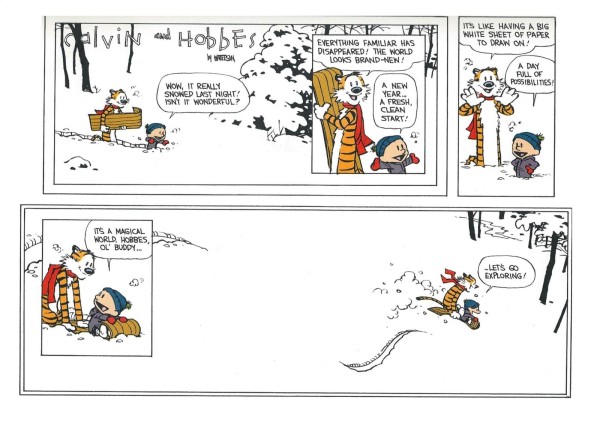It's always enlightening and refreshing to look back on the past and see how far we've come -- the obstacles we've overcome, the tragedies we've endured, the victories we relish, and the innovations that have changed and shaped our lives for years to come. In this installment of A Geek's Almanac, we take a look at historical events of past Decembers.
December 1
In 1887, Ward Lock & Co. publishes a short story called A Study in Scarlet, which introduces the two most famous characters in investigative fiction: Sherlock Holmes and Dr. Watson. The author of the story, Sir Arthur Conan Doyle drew inspiration for Sherlock Holmes, particularly his nearly fantastic deduction abilities, from Dr. Joseph Bell, a lecturer at the University of Edinburgh who Doyle once worked for. Doyle's influence on the genre and Sherlock's popularity as a character is still running strong, especially with the recent running of BBC's Sherlock, which aired in 2010.
December 2
In 1942, the first controlled nuclear chain reaction was demonstrated at the University of Chicago through Chicago Pile-1, the world's first nuclear reactor.
December 3
In 1967, Dr. Christiaan N. Barnard performed the world's first successful heart transplant from one human to another. The operation lasted nine hours and had a team of 30 people.
December 4
In 1987, IBM ships out the first copies of the OS/2 Standard Edition 1.0 operating system... which would later be discontinued December 31, 2006. A moment of silence, please.
December 5
In 1933, the 21st Amendment to the Constitution, repealing prohibition, was ratified.
December 6
In 1923, a presidential address was broadcasted on the radio for the first time when Calvin Coolidge spoke before Congress. So clear was the broadcast, people were confused by the "grating noise" they heard over the radio -- which turned out to be the President shifting aside the papers of his speech.
December 7
In 1979, Paramont Pictures releases Star Trek: the Motion Picture, the first film based on Star Trek. It was directed by Robert Wise and stared William Shatner, Leonard Nimoy, DeForest Kelley, James Doohan, George Takei, Walter Koenig, Nichelle Nichols and Majel Barrett.
December 8
In 1765, Eli Whitney, the inventor of the cotton gin, is born. The cotton gin was an important invention that separated cotton from seeds, and was much faster and more efficient than manual hand picking, giving the industry a boost of speed.
December 9
In 1993, U.S. astronauts completed repair work on the Hubble Space Telescope, the only telescope designed to be serviced by space astronauts. Observations made through the Hubble have led to numerous breakthroughs in astrophysics, such as accurately calculating the rate of expansion of the universe.
December 10
In 1901, the first Nobel Prizes were awarded in Stockholm, Sweden, in the fields of physics, chemistry, medicine, literature and peace.
December 11
In 2001, the FBI initiates undercover operations to combat software piracy. It was known as "Operation Buccaneer",among other names. On December 11, 2001, FBI agents targeted 62 people suspected of software piracy and seized over 140 computers, but with no immediate arrests.
December 12
In 1988, Atari Games began to produce Nintendo-compatible game catridges that circumvented the security system placed in the games. Atari brought Nintendo to court, accusing Nintendo of unfair competition and monopolizing the game market.
December 13
In 2007, Nate Ritter and Dan Tentler used Twitter and Flickr to provide real-time updates about the San Diego fires, such as evacuations and where to gather supplies. Utilizing social media allowed the journalists to report breaking news more quickly than mainstream media. We saw this happen again with the Boston Marathon bombings and other current, real-time hot news events. Events which result in this usage of social media is rapidly transforming the way we receive news forever.
December 14
In 1967, DNA is synthesized for the first time by Arthur Kornberg and his colleague, which provided significant insight into the structure of DNA and how it can be created artificially.
December 15
On this day in December 1832, Gustave Eiffel, designer of the Eiffel Tower, is born.
December 16
In 1917, Arthur C. Clarke, prolific science fiction author, is born. In 1968, he collaborated with filmmaker Stanley Kubrick on 2001: A Space Odyssey.

December 17
In 1969, the US Air Force ended its "Project Blue Book" and concluded that there was no evidence of extraterrestrial activity behind UFO sightings.
December 18
In 1957, the shipping port Atomic Power Station in Pennsylvania became the first civilian nuclear facility to generate electricity in the United States.
In 1966, popular Christmas movie How the Grinch Stole Christmas!, adapted from a book written by Dr. Seuss, is released.
December 19
In 1972, Apollo 17 splashed down in the Pacific, ending the Apollo program of manned lunar landings. Apollo 17 landed 6.4 kilometers away from the recovery ship.
December 20
In 1996, American astronomer, astrophysicist, cosmologist, author, and science popularizer Carl Sagan dies in Seattle at age 62. Sagan was a huge influence behind the advocacy of science and the search for extraterrestrial life. His scientific studies and empathetic observations of the human existence in the universe captured the imagination and inspirations of people around the world.
December 21
1937, Disney's first full length animated film in colour, Snow White the Seven Dwarves, is released. The film received a standing ovation at its premiere screening at Carthay Circle Theatre.
December 22
The original tradition for decorating a Christmas tree was to hang lit candles from it... which obviously had some fundamental risks involved. In December, 1865, the tradition was completely changed thanks to Edward H. Johnson. A close friend of Thomas Edison, a year after the incandescent bulb was invented, Johnson used the light bulbs to decorate a tree in the window, which attracted the attention of the press. Johnson's handsome tree was admired so strongly that it quickly became the tradition we are familiar with today.
December 23
This day is the official date for Festivus, a fictional holiday from the TV sitcom Seinfeld to resist the commercialism of the Holiday season. Don't forget your Festivus poles!
December 24
The crew of Apollo 8, the first manned mission to the Moon, made a broadcast to Earth on Christmas Eve, resulting in the most watched television broadcast of all time. The members of the crew, Bill Anders, Jim Lovell, and Frank Borman each take turns reading from Book of Genesis while looking upon the vast, beautiful Earth from space.
December 25
We all know this is a big day for Christian traditions, but did you know it is also the birthdate of the Web? Sir Timothy John Berners-Lee invented the World Wide Web at CERN, the European Organization for Nuclear Research, and made the first successful hypertext communication in 1990 on this day.
December 26
How did you feel this morning when your alarm clock blared by your head and jarred you awake? Are you the kind of person who isn't quite harmonized with the rest of the world until they have a good sixteen ounces (or more) of coffee? If so, then on December 26, you should thank James H. Mason, who in 1865, made the first U.S. patent for the coffee percolator, leading to new innovations in the coffee scene. Cheers!
December 27
In 1831, Charles Darwin embarks upon the HMS Beagle. This embarkment is the beginning of his five year long voyage, where he conducts his study of foliage and wildlife on the Galapogos Islands. These observations would allow Darwin to develop his theory of evolution and change the way humans look at the world.
December 28
Remember the Y2k scare? After much speculation, controversy and fear, in 1998, U.S. president Bill Clinton announces that the computers that controls the nation's Social Security payments are Y2K compliant and that no problems would arise with the payments.
December 29
In 1852, Emma Snodgrass is arrested in Boston for wearing pants and is repeatedly mocked in newspapers for wearing men's clothing. The 1852 article from the New York Times Daily read, "Yesterday she left the house, but soon after returned, dressed in a frock coat, cap, vest and pants. The bar-keeper at once recognized her, and informed the Chief of Police of her whereabouts. What her motive may be for thus obstinately rejecting the habiliments of her own sex, is not known."
December 30
On December 30, 1950, Bjarne Stroustrup, creator of C++, is born. Beginning the work in 1979, Stroustrup relied on his programming experience from his Ph.D thesis to create a new language that was fast and flexible. Originally called "C with Classes", the programming language got the name it is now known by four years later.
December 31
Popular comic strip Calvin and Hobbes by Bill Waterson began its run in newspapers in 1985. Featuring a mischievous young boy who was often times too rambunctious, too imaginative, and too clever for his own good, and his imaginary tiger friend Hobbes, Calvin and Hobbes strips were full of endearing shenanigans and musings both scientific and poetic. 3,150 strips later, Calvin and Hobbes finally say goodbye on December 31, 1995.
 And there you have it, some highlights of Decembers past. Perhaps the reflection will inspire you today to do your very best and keep your chin up high. After all, look how far we've come. So, you heard Calvin-- let's go exploring.
And there you have it, some highlights of Decembers past. Perhaps the reflection will inspire you today to do your very best and keep your chin up high. After all, look how far we've come. So, you heard Calvin-- let's go exploring.
See Also:
[dfads params='groups=932&limit=1&orderby=random']
[dfads params='groups=937&limit=1&orderby=random']